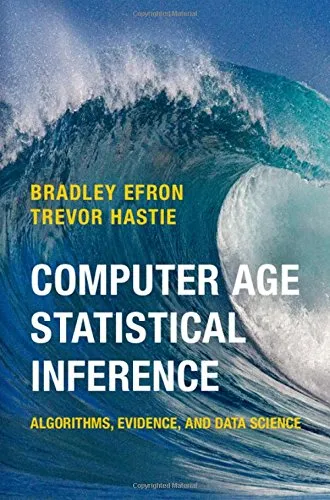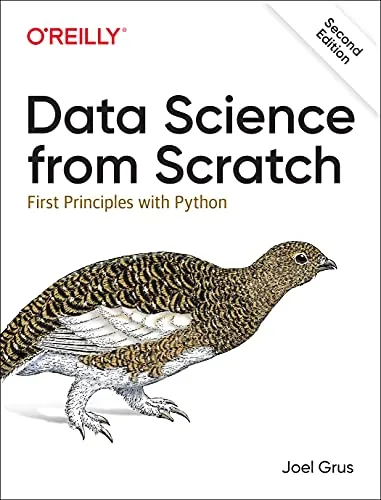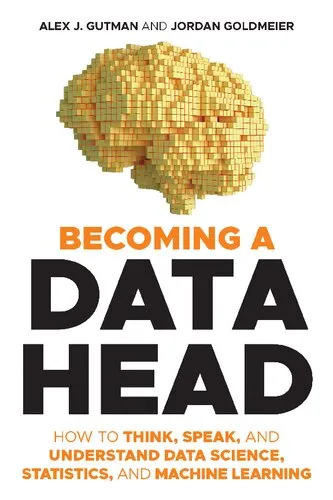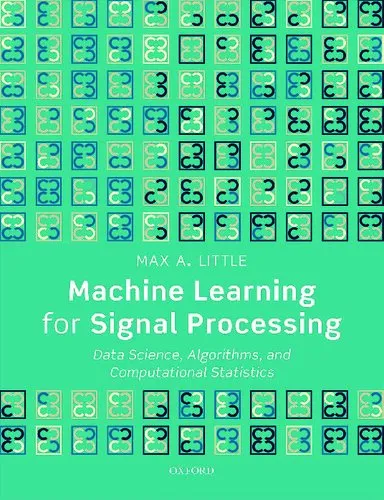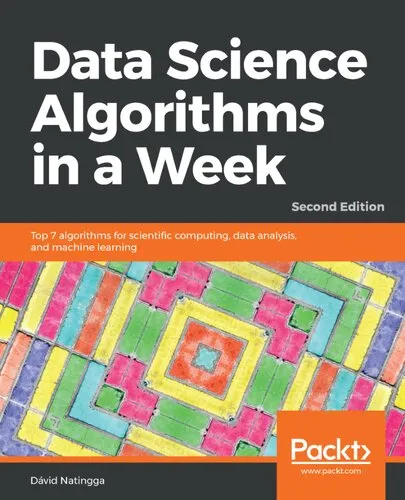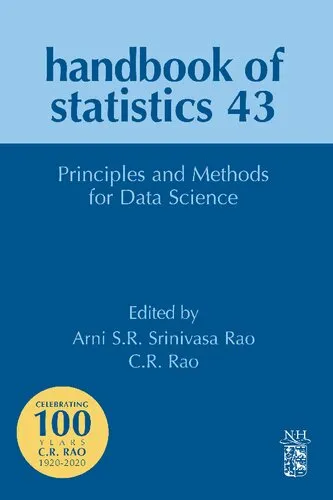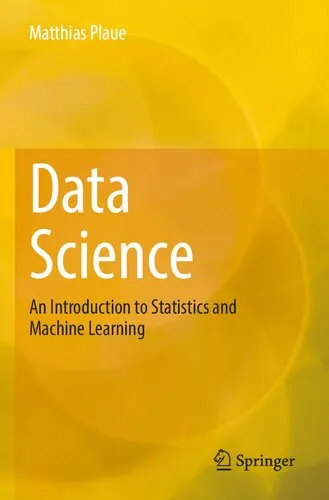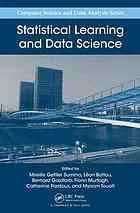Computer Age Statistical Inference: Algorithms, Evidence, and Data Science
4.6
بر اساس نظر کاربران

شما میتونید سوالاتتون در باره کتاب رو از هوش مصنوعیش بعد از ورود بپرسید
هر دانلود یا پرسش از هوش مصنوعی 2 امتیاز لازم دارد، برای بدست آوردن امتیاز رایگان، به صفحه ی راهنمای امتیازات سر بزنید و یک سری کار ارزشمند انجام بدینکتاب های مرتبط:
معرفی کتاب: Computer Age Statistical Inference: Algorithms, Evidence, and Data Science
کتاب Computer Age Statistical Inference نوشته بردلی افرون و ترِوُر هاستی، اثری بینظیر در حوزه آمار رایانهای، یادگیری ماشین و علم دادههاست. این کتاب سفری است از نظریههای کلاسیک آمار تا کاربردهای مدرن آن در عصری که دادهها و الگوریتمها بر تصمیمگیریها تسلط یافتهاند.
خلاصهای از کتاب
کتاب Computer Age Statistical Inference به سه بخش اصلی تقسیمبندی شده است. بخش اول، به مبانی آماری و روشهای کلاسیک میپردازد که قبل از ورود کامپیوتر به تحلیلهای آماری مورد استفاده قرار میگرفتند. این قسمت شامل موضوعاتی نظیر Maximum Likelihood Estimation و Bayesian Inference است. بخش دوم، به ظهور محاسبات عددی و تأثیر آن بر روشهای آماری مدرن مانند Bootstrap و الگوریتمهای Monte Carlo میپردازد. در نهایت، بخش سوم به موضوع یادگیری ماشین و علمی نوظهور با محوریت الگوریتمهایی همچون Support Vector Machines، Deep Learning و Random Forests اختصاص دارد.
این کتاب با استفاده از شبیهسازیها، تحلیل دادههای واقعی و ارائه مثالهای قابل فهم، پلی میان تئوری و عمل برقرار میکند. زبان روان نویسندگان به همراه دیدگاه جامع آنها بهگونهای طراحی شده که علاوه بر متخصصان، برای دانشجویان و افراد مبتدی نیز جذاب و مفید باشد.
نکات کلیدی (Key Takeaways)
- بررسی تکامل مفاهیم آماری از دوران پیش از کامپیوتر تا عصر هوش مصنوعی.
- مروری بر روشهای کلاسیک همچون Linear Regression و Maximum Likelihood.
- معرفی ابزارهای محاسباتی پیشرفته نظیر Bootstrap و Bayesian Computation.
- تأکید بر الگوریتمهای یادگیری ماشین مانند Neural Networks و Boosting.
- تحلیل تعادل میان مدلهای پیچیده و قابلیت تفسیر آنها.
- نکات عملی برای انتخاب مدل آماری مناسب و ارزیابی عملکرد الگوریتمها.
جملات معروف از کتاب
“Statistics lost its innocence when computers arrived on the scene.”
“We are living in a golden age of computation-driven statistical discovery.”
چرا این کتاب اهمیت دارد؟
کتاب Computer Age Statistical Inference نقشه راهی است برای درک چگونگی تکامل علم آمار در عصر دیجیتال. در دنیایی که دادهها به عنوان سوخت موتورهای تصمیمگیری شناخته میشوند، آشنایی با ترکیب قدرت ریاضی، آمار، و تکنولوژی کامپیوتری امری ضروری است. این کتاب نه تنها مفاهیم تئوری را به زیبایی توضیح میدهد بلکه کاربردهای عملی و دنیای واقعی آنها را نیز پوشش میدهد.
برای پژوهشگران، تحلیلگران داده و دانشجویان، این اثر فرصتی بینظیر است تا از خرد نویسندگان برجستهای همچون افرون و هاستی بهرهمند شوند. همچنین، این کتاب به خوانندگان نشان میدهد که چگونه الگوریتمها میتوانند به یادگیری بهتر از دادهها و تصمیمگیریهای دقیقتر کمک کنند. اهمیت این کتاب در این است که همزمان تئوری و عمل را بهطور موازی پوشش داده و این ویژگی ارزش آن را چندین برابر میکند.
مطالعه این کتاب برای هر کسی که در حوزه آمار، یادگیری ماشین یا علم داده فعالیت میکند، نه تنها یک توصیه بلکه یک ضرورت است.
Introduction to "Computer Age Statistical Inference: Algorithms, Evidence, and Data Science"
"Computer Age Statistical Inference: Algorithms, Evidence, and Data Science," written by Bradley Efron and Trevor Hastie, is a landmark text that bridges the gap between classical statistical concepts and the machine learning algorithms that dominate today’s data-centric world. With the advent of modern computational capabilities, the field of statistical inference has undergone a dramatic transformation, moving from classical formula-based methods to computational techniques that can grapple with vast and complex datasets. This book serves as both a historical overview and a forward-thinking guide to the ways algorithms and statistical methods intersect in the age of data science.
Detailed Summary of the Book
The book is a compelling exploration of how statistical inference has evolved over time. It begins by revisiting traditional inferential perspectives, such as Bayes, frequentist, and Fisherian methodologies. These early methods laid the groundwork for modern developments by emphasizing the need for structured approaches to uncertainty and evidence in decision-making.
As the narrative unfolds, Efron and Hastie introduce the concept of resampling methods, such as the bootstrap and jackknife, which have revolutionized inferential statistics by leveraging computational power to model complex problems. The text then delves into the machine learning revolution, providing an in-depth look at classification, clustering, and other learning algorithms that have become indispensable tools for modern data analysis. Popular techniques like support vector machines, decision trees, and ensemble methods are thoroughly explored, alongside their practical implications and underlying mathematics.
The authors also highlight Bayesian networks and Markov Chain Monte Carlo (MCMC) methods, which have opened new avenues for probabilistic reasoning in high-dimensional problems. The final chapters focus on concepts like sparsity, the lasso, and deep learning, connecting these modern ideas to long-standing statistical traditions. By combining the theoretical underpinnings of statistics with cutting-edge computational techniques, this book strikes a rare balance between historical context and modern relevance.
Key Takeaways
- Statistical inference serves as the foundation of data analysis, but modern computational tools have transformed its application.
- The advent of resampling methods, such as the bootstrap, demonstrates how computers have revolutionized classical statistical problems.
- Machine learning and statistical inference are intertwined, with shared goals of discovering patterns and making data-driven predictions.
- Contemporary methods like sparsity, the lasso, and deep learning owe their success to both theoretical statistics and computational advancements.
- The book emphasizes the importance of rigorous evidence in evaluating algorithmic and statistical models for real-world applications.
Famous Quotes from the Book
"Algorithms determine the ways we uncover structure in data, but statistical inference ensures we don't mistake random noise for meaningful patterns."
"The computer hasn't just reshaped statistical inference; it has changed what we mean by ‘evidence’ in the data-drenched age of science."
"Statistical thinking is not a relic of the past but the backbone of modern machine learning and artificial intelligence."
Why This Book Matters
"Computer Age Statistical Inference" stands out as a vital resource for understanding how traditional statistical principles inform and are informed by the vast array of modern computational tools. Its importance lies in its ability to bridge two worlds: the rigorous theoretical foundations of classical statistics and the dynamic, ever-evolving landscape of data-driven algorithms. By addressing real-world problems using concrete examples and simulations, Efron and Hastie guide the reader through complex ideas in an accessible yet thorough manner.
Current and aspiring data scientists, statisticians, and researchers will find this book an indispensable guide. It not only explains the technical details of methods like resampling, regularization, and deep learning but also places them in a broader historical and conceptual framework. Given the explosion of data in every domain, understanding these methods is no longer optional but essential. Efron and Hastie provide the tools and insights necessary to navigate the challenges and possibilities of the data revolution.
In short, this is a book for anyone who wishes to understand the interplay between algorithms, evidence, and statistical reasoning at a time when such understanding is more critical than ever to sound decision-making and scientific progress.
دانلود رایگان مستقیم
شما میتونید سوالاتتون در باره کتاب رو از هوش مصنوعیش بعد از ورود بپرسید
دسترسی به کتابها از طریق پلتفرمهای قانونی و کتابخانههای عمومی نه تنها از حقوق نویسندگان و ناشران حمایت میکند، بلکه به پایداری فرهنگ کتابخوانی نیز کمک میرساند. پیش از دانلود، لحظهای به بررسی این گزینهها فکر کنید.
این کتاب رو در پلتفرم های دیگه ببینید
WorldCat به شما کمک میکنه تا کتاب ها رو در کتابخانه های سراسر دنیا پیدا کنید
امتیازها، نظرات تخصصی و صحبت ها درباره کتاب را در Goodreads ببینید
کتابهای کمیاب یا دست دوم را در AbeBooks پیدا کنید و بخرید
1327
بازدید4.6
امتیاز0
نظر98%
رضایتنظرات:
4.6
بر اساس 0 نظر کاربران
Questions & Answers
Ask questions about this book or help others by answering
No questions yet. Be the first to ask!
